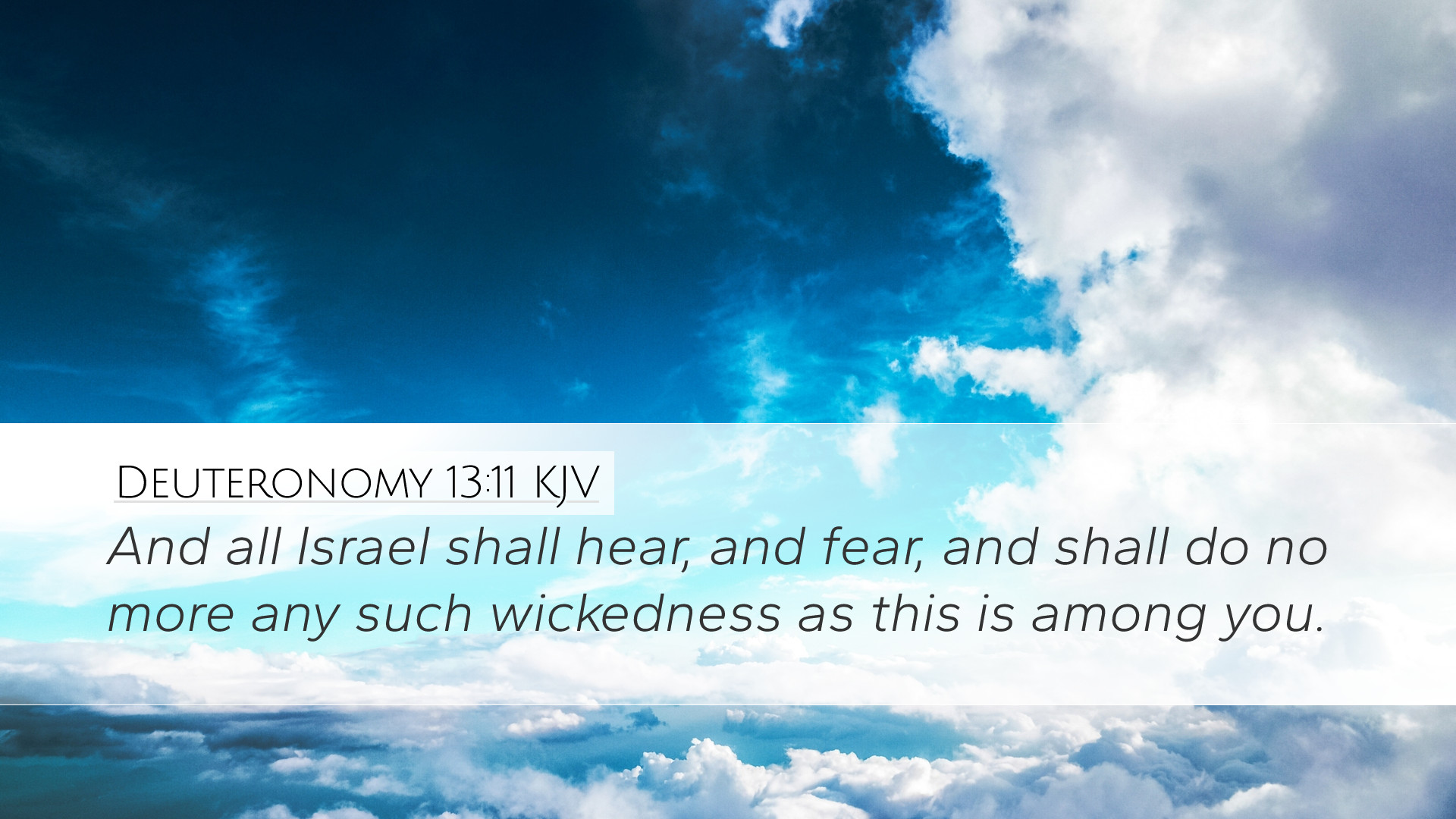Commentary on Deuteronomy 13:11
Verse Context: Deuteronomy 13:11 states, "And all Israel shall hear, and fear, and do no more any such wickedness as this is among you." This verse is part of a larger section in Deuteronomy where Moses reiterates the laws that govern the community of Israel, focusing significantly on the importance of loyalty to God and the severe consequences of apostasy.
Summary of Key Themes
- The Importance of Collective Responsibility: This verse emphasizes the collective nature of Israel's identity as the people of God. The accountability is not just individualistic but communal, which means that the actions or sins of one can reflect upon or influence the whole community.
- The Fear of God: The fear mentioned denotes a profound respect and reverence for the Lord, especially concerning His holiness and justice. Such fear should lead to a collective resolve to abstain from wickedness.
- Preventative Measures Against Apostasy: Moses instills a warning among the Israelites about the influence of false prophets and the severe repercussions of leading others astray, urging the community to respond to wickedness with vigilance.
- Response to Wickedness: The expectation is clear—upon hearing the truth about falsehood and apostasy, Israel must not only feel the fear of the Lord but take decisive action to eliminate such influences.
Insights from Public Domain Commentaries
Matthew Henry's Commentary
Matthew Henry discusses this verse within the broader context of the seriousness of idolatry and false teaching. He highlights that the church must be diligent in its discernment and maintain a purity of doctrine. He notes, “The intention of this command is that all Israel should hear and fear.” Henry emphasizes the educational aspect; the Israelites, learning of the consequences of sin, are instructed to guard against the temptations of idolatry.
He also suggests that this collective awareness will foster a spirit of holiness among the people: “Thus they shall learn the greatness of sin, and the terror of the Lord.” His perspective reinforces the idea that public knowledge of sin and its ramifications should engender a culture of piety and accountability.
Albert Barnes' Notes on the Bible
Albert Barnes elaborates that the declaration in this verse serves multiple functions—it acts as a deterrent against sin and promotes a vigilant community. He notes that the imperative to hear and fear corresponds to a direct call for active listening to the law and its implications. “The noise of evil must be heard, that wholesome fear of it may be impressed upon all.”
Barnes further explains the theological significance behind the collective fear: it is a fear rooted not only in dread but also in an understanding of the covenant relationship between God and His people. This fear should cultivate a desire to adhere strictly to God’s commandments and a commitment to communal purity.
Adam Clarke's Commentary
Adam Clarke approaches Deuteronomy 13:11 with a focus on the judicial implications of false prophets. He elaborates that the act of purging evil from the community is foundational for the moral health of Israel. Clarke expresses that “If evil is tolerated, the wrath of God will put off His protection from His people.”
He expands on the role of fear in enhancing moral conduct, suggesting that the threat of divine judgment is a potent motivator for obedience. Clarke argues that the public nature of the sin and its punishment is crucial in maintaining societal integrity. The society's shared experience of witnessing accountability reinforces communal standards of righteousness.
Practical Applications
- Church Discipline: Just as Israel was called to respond collectively to wickedness, modern congregations must also take seriously the need for accountability and discipline to protect the integrity of the community.
- Education and Awareness: Educating congregants on the dangers of false teachings and idolatry can help build a culture that values truth and holiness. Fear, in this context, becomes a guardian of community morals.
- Encouraging Reverence for God: Fostering a proper fear of the Lord can guide believers in their personal conduct and strengthen their communal ties. Respecting the divine authority encourages a lifestyle aligned with God’s precepts.
- Engaging in Collective Worship: As Israel was to hear and respond together, congregational worship and activities should reinforce the principles of collective holiness and mutual support in faith.
Conclusion
Deuteronomy 13:11 serves as a profound reminder of the shared responsibility that the people of God have towards one another in maintaining faithfulness. Through the insights of Matthew Henry, Albert Barnes, and Adam Clarke, the themes of communal accountability, the nature of divine fear, and the serious implications of leading others astray are underscored. For pastors, students, theologians, and scholars, this verse and its nuances provide fertile ground for exploring the delicate balance between judgment, mercy, and communal identity within the body of Christ.


